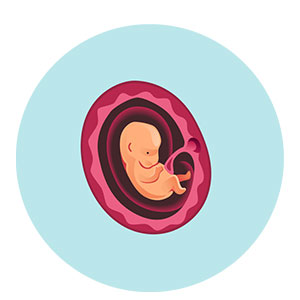 1st MonthIt’s the beginning of your first trimester. Right now, your baby is layers of cells that are on the way to development. At this stage, your hormone levels significantly change, heart rate increases, breasts are swollen, your
placenta is beginning to form and the uterus stretches to support the growth of the fetus and placenta. |  2nd MonthBaby is starting to grow and move, but you probably won’t feel it! You may notice first trimester symptoms beginning to develop around this time, including constipation, fatigue, headache, increased urination and morning sickness. |  3rd MonthYour baby is about the size of a blueberry towards the end of your first trimester. Organs, limbs and brain are in place and are starting to develop. Your baby also begins to develop their eyes, ears, arms, legs, mouth, taste buds,
hair follicles, nasal passage and facial features. |

